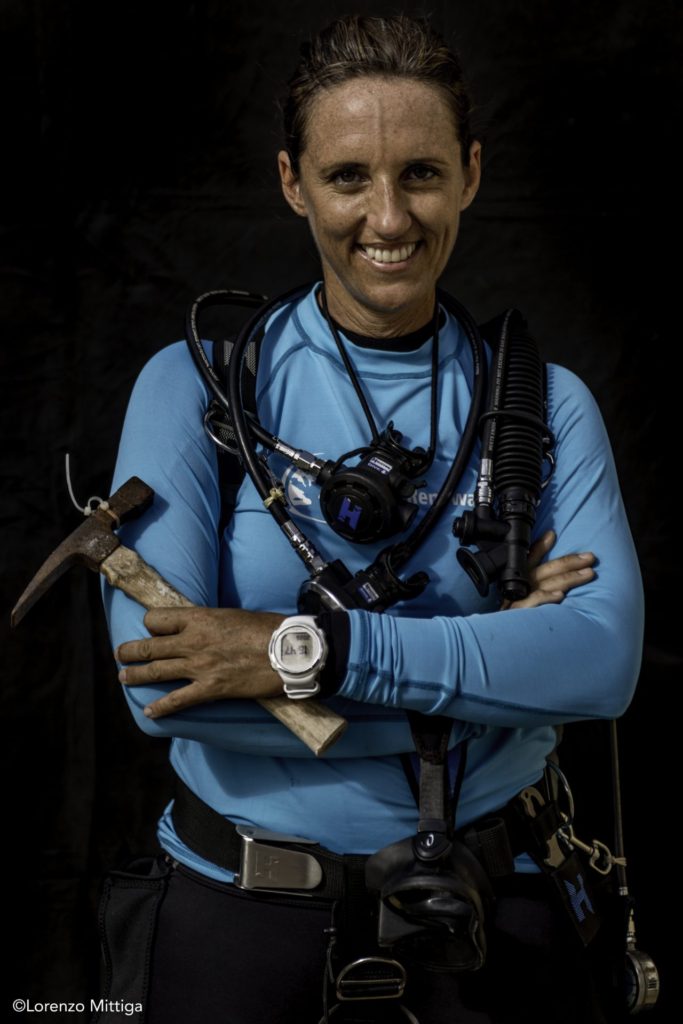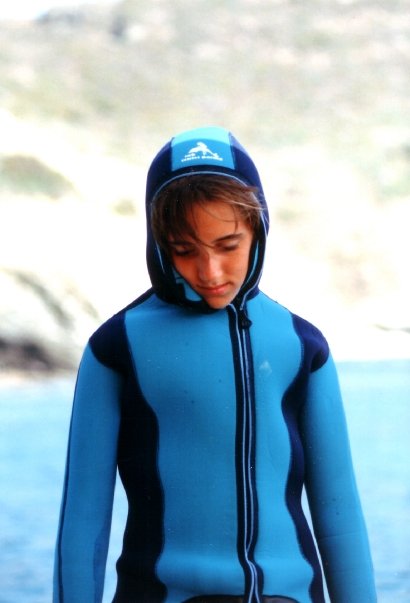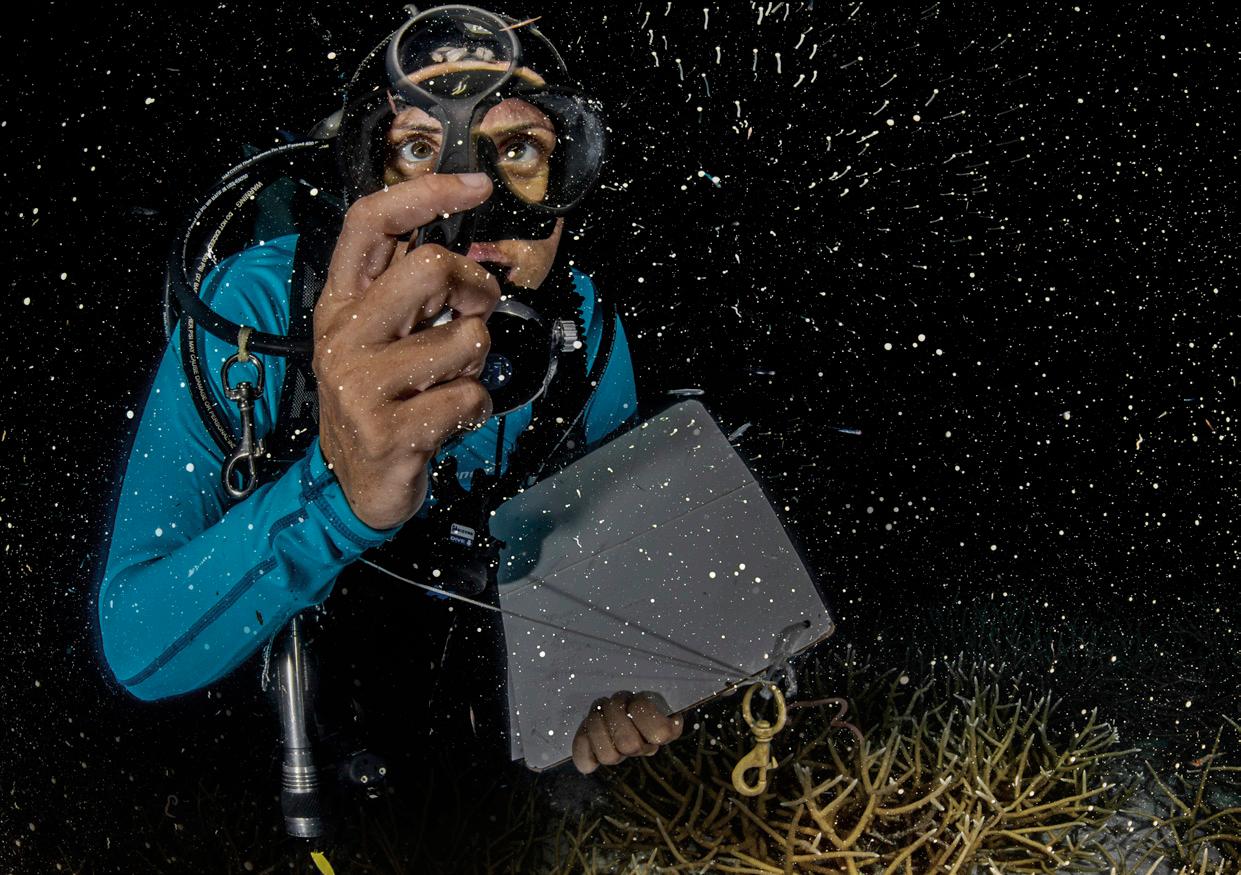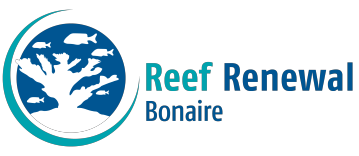
Francesca Virdis
Chief Operating Officer
Francesca Virdis has played an integral role in coral restoration efforts on Bonaire since 2010, 2 years before the inception of Reef Renewal Foundation Bonaire. Over the last decade, she’s spearheaded the growth of the organization from just 2 small nurseries to 13, not to mention almost 20 restoration sites – all while piloting new restoration techniques and expanding RRFB’s community of volunteers and partners. Our interns Lola and Lien sat down with Francesca to explore her role at RRFB, inspiration, and goals for the future.
Let’s meet the woman at the helm of coral reef restoration on Bonaire
Francesca checks on coral fragments harvested from the nursery en route to their outplanting site. Photo: Lorenzo Mittiga
By Lien Bruyland & Lola Salvador
Why did you choose Bonaire? Tell us a bit about your journey.
I ended up in Bonaire by accident. At thirty years old, I worked as an environmental consultant and needed a change in my career. I felt like I wasn’t fully using my skills and strengths in the office, and neither was I following my passion. To truly decide, I knew I needed to be closer to the ocean. I visited Bonaire after a close friend of mine suggested a dive vacation over dinner. Long story short, I fell in love with the island, with all its challenges and beauty. Soon after, I resigned from my job in Italy and started working here as a dive instructor.
Were you always interested in marine conservation?
Absolutely! The ocean has been my passion since I was born. My dad was a free diver, scuba diver and fisherman. We’d spend three months on the sea every summer, where I learned to swim, snorkel, free dive, and scuba dive at very early age.
“My connection with the ocean started when I was a kid. Since then, I’ve wanted to do everything I can to protect it.”

Young Francesca gets ready to go on a dive in Sardinia, Italy in 1990
You were an environmental consultant before becoming a dive instructor. Why did you eventually choose to focus on coral restoration?.
Working as a dive instructor here, I fell in love with coral reefs. I discovered I really enjoyed teaching and sharing my passion for the ocean with people. When the idea for a coral restoration initiative started, I really wanted to be part of it.
Looking back at ten years of RRFB, what are you most proud of?
Two things: first, our achievements under water. Seeing our outplanted corals spawn for the first time, we really felt like we’re making a difference. We’d seen these coral grow from just a few centimeters to covering an area of almost 2,500 square meters. Seeing then spawn altogether – it was very touching.
Secondly, I’m very proud of the community we were able to build. Ten years ago, most people were very skeptical about restoration on an island where there were already so many conservation efforts. It was hard to find support and involve people – and there was always this uncertainty of where restoration would bring us. What was the goal we were striving for? But it’s been very rewarding to see people becoming ambassadors for the reefs, talking about how they see the difference under water and how rewarding it is to outplant corals. We started with only 1 supporting dive shop and today we have 13; thanks to them, we’ve trained more than 1,500 restoration divers!
Is there anything you would have done differently?
No. I am the person I am today because of the mistakes I made along the road. I had to learn a lot during that process – there are so many different components like fieldwork, research, and community outreach that need to work together. I didn’t think about these aspects when I started this project as a diver outplanting a few corals back to the reef.
“It’s been a long journey with a lot of mistakes along the way – but it made me the person I am today”
If you weren’t restoring corals, what would you do?
Maybe I would have been an explorer! I love challenges, exploring nature, and travelling in general. Extreme environments like cave diving, deep water, and mountains really speak to me. Exploring comes with a lot of challenges that have to do with organization and team-building – it’s fascinating.
Francesca exploring deep reef off the north coast of Bonaire in 2016. Photo: Kirill Egorov
You’re already an explorer, paving the way for reef restoration here on Bonaire. Who would you say is your role model?
I have a lot of role models. I think we are quite imperfect on our own- so instead, I have a lot of people I find inspiring, each for their own contributions. When I was a kid, Jacques Cousteau showed us something we couldn’t see with our own eyes, he opened this world to us. That’s how I fell in love with the ocean.
A more modern explorer that inspires me is Sylvia Earle. She is a woman, a nature conservation hero, and an pioneer of marine exploration. She’s been doing this for so many years when it was very hard to find a spot for a woman, and she does it in such an elegant and respective way. I really admire the person she is today.
“I remember when I made the decision to quit my successful job and move to Bonaire – a lot of people tried to discourage me because they thought it was too risky. There are no risky decisions if you’re following your heart.”
Considering you are also a role model for a lot of people, what advice would you give someone who wants to follow in your footsteps?
Looking back at my twenties, I wish I had the mind I had today. When you start your career, you can be insecure and doubt yourself – and you let a lot of people guide you. Today, I would say listen to your heart. What’s your real passion? This way, you’ll never fail and always be happy.
You’ve told us a lot about your passion for marine conservation, is there anything people might not know about you?
I’ve tried a lot of different things in my life, because I’m very curious and crave challenges. In my previous life, I played cello at the conservatory and sang in a choir. I still have a passion and respect for music. Now that I’m not a musician anymore, I love to listen to music when I cook. I became a much more relaxed person. Before, I was always looking for the next challenge. Today, I’m a quieter person. To unwind and relax, I like to stay home, listen to music, and have my dogs around.
We talked about ten years in the past, of course we’re curious about ten years in the future. What would you like to achieve?
Personally, I would love to build an army of coral lovers. It would be a dream. Overall, I would love to see more protection for coral reefs, more reef awareness, and more respect for nature overall. I believe we can really change if we want to, and we’ve seen that during the pandemic. People were able and willing to stay home all over the planet. We need positive change in the next ten years – because I don’t think we have ten years. The planet is really screaming at us at this point.
“I’d love to see an overall change in mindset from seeing nature as something we can use to something that is a part of us.”

Francesca amidst gamete bundles released by spawning staghorn coral (Acropora cervicornis). Photo: Lorenzo Mittiga





